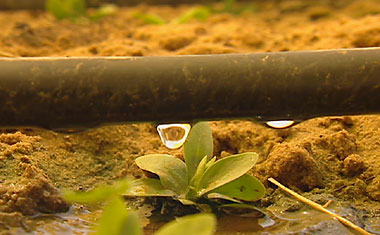A drip irrigation system : scarcity makes Israel a world leader in water conservation. Picture taken from the “Landline” site of ABC TV, Australia. http://www.abc.net.au/landline/stories/s303636.htm
After signing the 1979 peace treaty with Israel, Egyptian President Anwar Sadat said his nation will never go to war again, except to protect its water resources. King Hussein of Jordan identified water as the only reason that might lead him to war with the Jewish state. The hidden factor Adapted from “Middle East Water Wars”, a BBC News article by Adel Darwish, May 30th 2003 |
Questions
1. Look at this map and this graph and explain the underlined paragraphs of the document above.
2. Read this article and look at this graph : what is happenning to the Dead Sea and why ?
3. Look at these maps (map #1 - map #2 - map #3) of Israel's main water sources, compare them to the map showing the occupied territories and read this article : which part does water play in the politics of the region ? Explain the Israeli position.
4. What is currently making things worse ? Read this article and summarize the situation it describes.
5. Look at the graphs and read the fact sheet about water issues in the occupied territories : compare the use of water between Palestinians, Israelis and settlers.
6. Read this page and this page : what could be the solution to the water problem in the area ?
